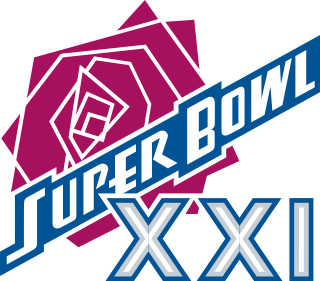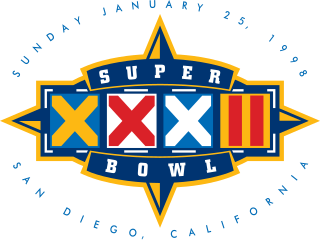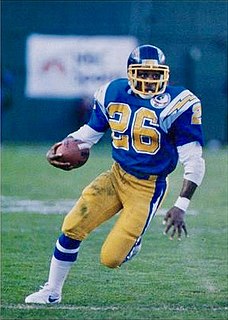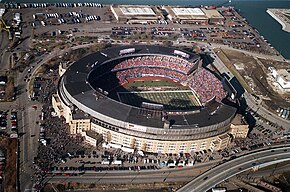
Super Bowl XXI was an American football game between the American Football Conference (AFC) champion Denver Broncos and the National Football Conference (NFC) champion New York Giants to decide the National Football League (NFL) champion for the 1986 season. The Giants defeated the Broncos, 39–20, for their first Super Bowl and first NFL title since 1956. The game was played on January 25, 1987, at the Rose Bowl in Pasadena, California. It was the first of consecutive Super Bowl losses for the Broncos, who lost the Super Bowl a year later 42–10 to the Washington Redskins.

Super Bowl XXII was an American football game between the National Football Conference (NFC) champion Washington Redskins and American Football Conference (AFC) champion Denver Broncos to decide the National Football League (NFL) champion for the 1987 season. The Redskins defeated the Broncos by the score of 42–10, winning their second Super Bowl. The game was played on January 31, 1988 at Jack Murphy Stadium in San Diego, California, which was the first time that the Super Bowl was played there. It was the second consecutive Super Bowl loss for the Broncos, who had lost to the New York Giants in the Super Bowl the year before.

Super Bowl XXIV was an American football game between the National Football Conference (NFC) champion San Francisco 49ers and the American Football Conference (AFC) champion Denver Broncos to decide the National Football League (NFL) champion for the 1989 season. The game was played on January 28, 1990, at the Louisiana Superdome in New Orleans, Louisiana. The 49ers defeated the Broncos by the score of 55–10, winning their second consecutive Super Bowl, and then-tying the Pittsburgh Steelers with four Super Bowl victories. San Francisco also became the first team to win back-to-back Super Bowls with two different head coaches; rookie head coach George Seifert took over after Bill Walsh retired following the previous season's Super Bowl.

Super Bowl XXXII was an American football game played between the National Football Conference (NFC) champion Green Bay Packers and the American Football Conference (AFC) champion Denver Broncos to decide the National Football League (NFL) champion for the 1997 season. The Broncos defeated the Packers by the score of 31–24. The game was played on January 25, 1998, at Qualcomm Stadium in San Diego, California, the second time that the Super Bowl was held in that city. Super Bowl XXXII also made Qualcomm Stadium the only stadium in history to host both the Super Bowl and the World Series in the same year.

Super Bowl XXXIII was an American football game played between the American Football Conference (AFC) champion Denver Broncos and the National Football Conference (NFC) champion Atlanta Falcons to decide the National Football League (NFL) champion for the 1998 season. The Broncos defeated the Falcons by the score of 34–19, winning their second consecutive Super Bowl. The game was played on January 31, 1999, at Pro Player Stadium in Miami, Florida.

John Albert Elway Jr. is an American professional football executive and former quarterback who is the president of football operations for the Denver Broncos of the National Football League (NFL).

In American football, The Fumble is a play that occurred during the 1987 AFC Championship Game between the Cleveland Browns and Denver Broncos on January 17, 1988, at Mile High Stadium in Denver, Colorado. The fumble occurred late in the fourth quarter of the game and cost the Browns a chance to tie the contest; the Broncos went on to win the game and the AFC Championship, advancing to Super Bowl XXII.
The National Football League playoffs for the 1997 season began on December 27, 1997. The postseason tournament concluded with the Denver Broncos defeating the Green Bay Packers in Super Bowl XXXII, 31–24, on January 25, 1998, at Qualcomm Stadium in San Diego, California.
The National Football League playoffs for the 1989 season began on December 31, 1989. The postseason tournament concluded with the San Francisco 49ers defeating the Denver Broncos in Super Bowl XXIV, 55–10, on January 28, 1990, at the Louisiana Superdome in New Orleans, Louisiana.

The National Football League playoffs for the 1987 season began on January 3, 1988. The postseason tournament concluded with the Washington Redskins defeating the Denver Broncos in Super Bowl XXII, 42–10, on January 31, at Jack Murphy Stadium in San Diego, California.
The National Football League playoffs for the 1986 season began on December 28, 1986. The postseason tournament concluded with the New York Giants defeating the Denver Broncos in Super Bowl XXI, 39–20, on January 25, 1987, at the Rose Bowl in Pasadena, California.

The National Football League playoffs for the 1977 season began on December 24, 1977. The postseason tournament concluded with the Dallas Cowboys defeating the Denver Broncos in Super Bowl XII, 27–10, on January 15, 1978, at the Louisiana Superdome in New Orleans, Louisiana.
The 1986 Denver Broncos season was the franchise's 27th year in professional football and its 17th with the National Football League (NFL). They finished the regular season with a record of 11–5, returned to the playoffs after a one-year absence, won the AFC Championship over the Cleveland Browns, and lost Super Bowl XXI to the New York Giants, the first of back to back Super Bowl losses for the team.
The 1986 Cleveland Browns season was the team’s 37th season with the National Football League. The death of Don Rogers, a promising young defensive back who was preparing to enter his third season in the NFL, cast a black cloud over the team as it prepared for the 1986 season.
The 1989 Cleveland Browns season was the team's 40th season with the National Football League.

The 1985 San Diego Chargers season was the franchise's 16th season in the National Football League (NFL), its 26th overall. The team improved on their 7–9 record from 1984 to an 8–8 finish. For the third time in five years, the Chargers led the league in scoring. It was Don Coryell's final full season as the team's head coach, as he would resign halfway through the following season after a 1–7 start.

The 1991 Denver Broncos season was the team's 32nd year in professional football and its 22nd as a member club in the National Football League (NFL). The team improved on its 5–11 from 1990, winning their third AFC West title in five years, and advanced to the AFC Championship game. Overall, the Denver Broncos had five players who were selected to participate in the Pro Bowl. Furthermore, this season also brought The Drive II in the divisional round of the playoffs.

The 1984 Denver Broncos season was the franchise's 15th season in the National Football League (NFL), and the 25th overall. The team finished with its then franchise-best record of thirteen wins and three losses and were champions of the AFC West. In the playoffs, the Broncos were upset by the Pittsburgh Steelers in the Divisional Round, 24–17. This would be the final season for Tight End coach Fran Polsfoot, who died in April 1985.

In American football, the Snowball Game was the November 11, 1985 National Football League game between the San Francisco 49ers and Denver Broncos. It was notable for a play in which spectators at Denver's Mile High Stadium disrupted a 49ers' field goal attempt by throwing snowballs from the stands.
The Broncos–Chiefs rivalry is a rivalry between the Denver Broncos and Kansas City Chiefs in the National Football League's AFC West division. Since the American Football League was established in 1960, the Broncos and the Chiefs have shared the same division, first being the AFL Western Conference, and since the AFL–NFL merger, the AFC West. For years, the rivalry has featured two of the best home-field advantages in the league. CBS ranked this rivalry as the No. 4 NFL rivalry of the 1990s in 2020.












